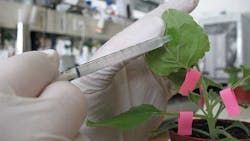Compound Given to Two American Ebola Survivors Goes into Full-Scale Production
A compound called ZMapp that was given to two American Ebola survivors has gone into full-scale production at a facility owned by Reynolds American, as reported by Janet Patton on Kentucky.com
Kentucky BioProcessing is making production of the the ZMapp compound, grown for Mapp Biopharmaceutical, its main priority.
Dr. Kent Brantly and Nancy Writebol, both Americans, recovered from Ebola after being given the ZMapp drug. So the compound has been sent to government agencies for testing.
However it is uncertain whether the ZMapp helped cure Brantly or Writebol, writes Patton. It has shown promising results in testing in primates and mice, curing most of them even after they showed signs of infection.
In September, Health and Human Services announced that it had issued an 18-month contract with Mapp Biopharmaceutical for as much as $42.3 million for "the development and manufacturing of the medication ZMapp toward the goal of U.S. Food and Drug Administration approval."
"While ZMapp has received a lot of attention, it is one of several treatments under development for Ebola, and we still have very limited data on its safety and efficacy," Dr. Nicole Lurie, assistant secretary for preparedness and response, said in a news release. "Developing drugs and vaccines to protect against Ebola as a biological threat has been a long-term goal of the U.S. government, and today's agreement represents an important step forward."
As part of the project, Mapp Biopharmaceutical is manufacturing a small amount of the drug for early-stage clinical safety studies and non-clinical studies needed to demonstrate the drug's safety and efficacy in people. Mapp Biopharmaceuticals also will work with the government on the manufacturing process, increasing production yields and the scale of manufacturing.
It takes several weeks to make the compound, which includes three monoclonal antibodies, which is then put into the tobacco plants to replicate, Howard said Tuesday. "The plants have to grow, then the proteins are extracted and purified," Howard said. "It potentially takes two months or a little longer to produce."
